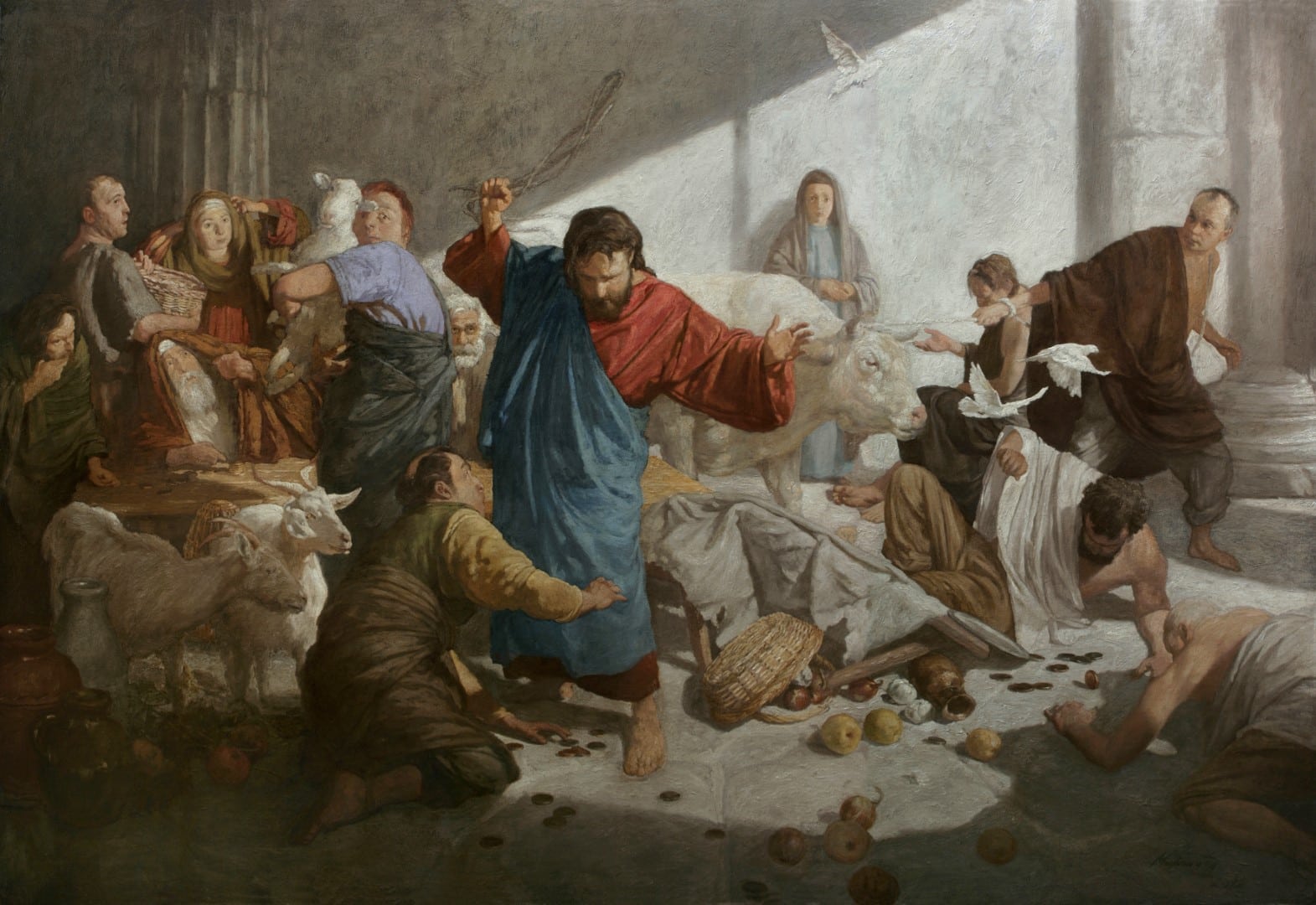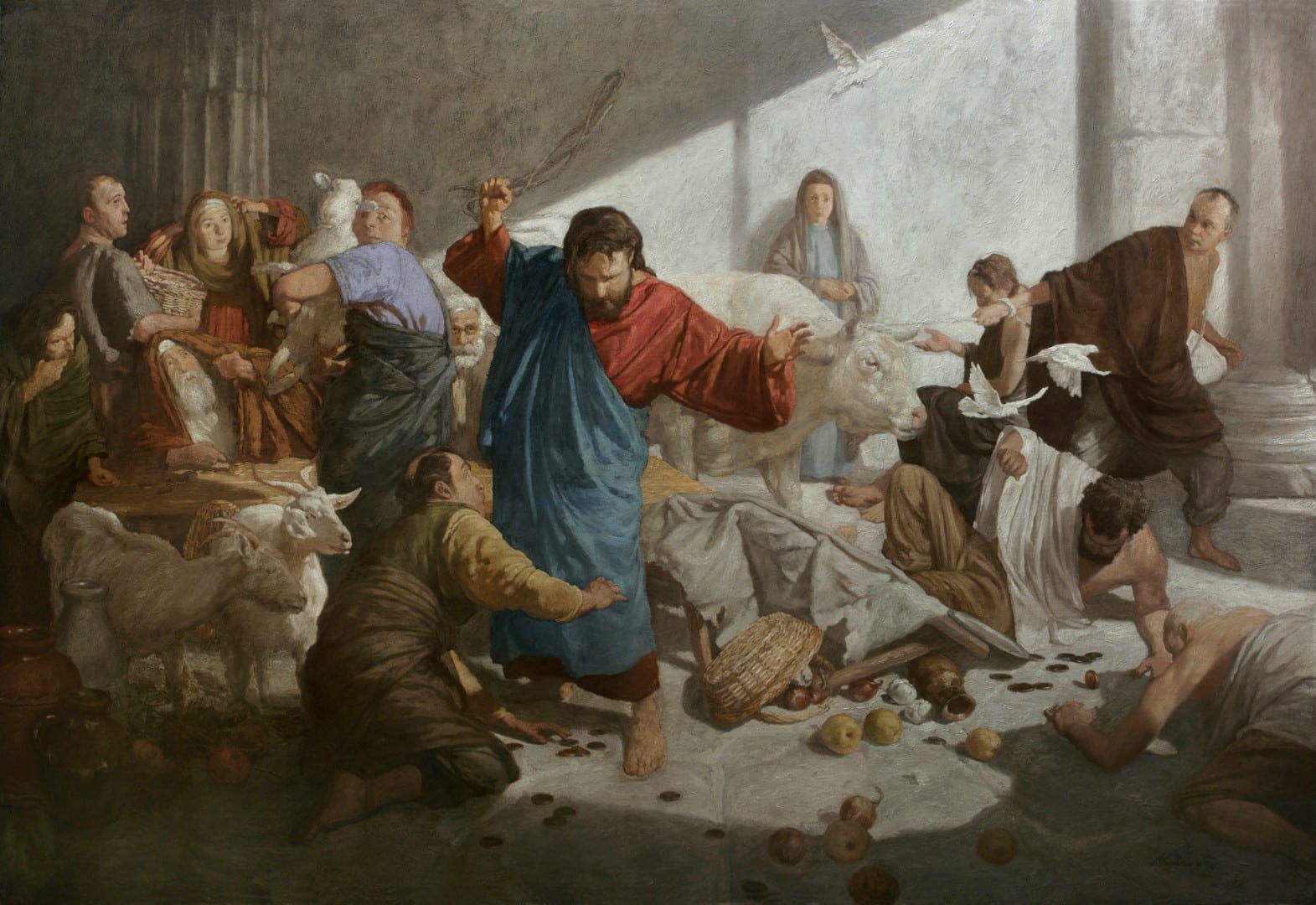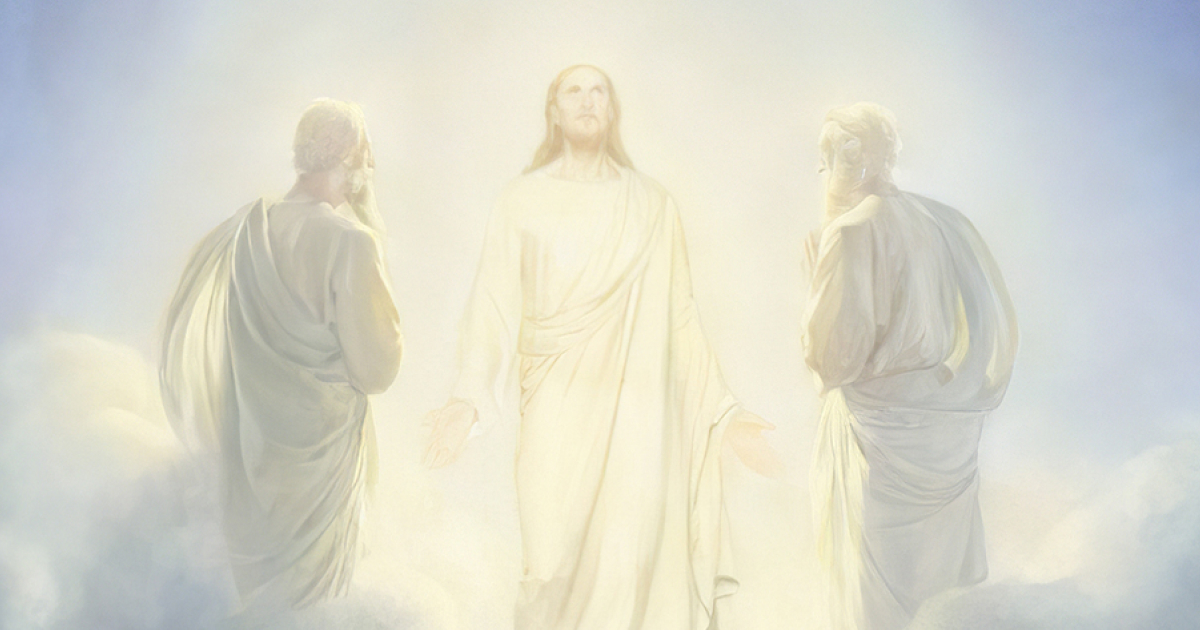“Making a whip out of some cord, he drove them all out of the Temple, cattle and sheep as well, scattered the money-changers’ coins, knocked their tables over and said to the pigeon-sellers, ‘Take all this out of here and stop turning my Father’s house into a market.’” (John 2:15-16)
In this coming Sunday’s Gospel, we have one of the most famous and rare images of Jesus from His earthly ministry: Why does Jesus get angry and how does He get away with it?
He was enraged not by what was happening - buying animals for sacrifice using Temple currency was normal, and His parents had done it when they presented Him to God forty days after His birth. The problem was where it was being done: inside the Temple itself, namely in the Court of the Gentiles, taking up space where non-Jews had the right to worship. When I take a seat at Holy Mass, whether it be in the pews or the sanctuary, am I taking up a space, by my worldliness, that someone still far from Christ would occupy more genuinely than me, if they heard the Gospel as I have?
But Jesus’ anger is controlled. He scourges the cattle and sheep with a whip and overturns the money-changers’ tables, but, significantly, He only speaks to the pigeon-sellers: it would be possible to re-herd the animals and pick up the tables but to recover pigeons would be nearly impossible. In other words, Jesus is careful to avoid causing damage to others’ property, even if He makes a scene in order to make his point.
Jesus is in control of His passions, and in His sacred passion He will freely be scourged with a whip rather than wield one. Do I have such control when I get angry, or does my anger control me?
And how does He gets away with this outburst? The Jews question Him and His reply sounds insane: "Destroy this temple and in three days I will raise it up" (John 2:19). Perhaps the Jews decided to let this supposed madman go free rather than try to deal with him and perhaps that was part of Jesus’s intention. But more deeply, Jesus was not speaking madness: He was predicting His death and resurrection.
He wanted to say something that His disciples would not understand yet but would later remember.
Jesus, You do that for us: You reveal things in an obscure way now and we only understand later. When we do understand, we realise Your plan has been unfolding all along, because You are in control of history, and our individual histories.
What are the things You are currently teaching me mysteriously? Help me understand quickly! Help me be humble about what I understand now - I may not yet understand as completely as I think.
In the later light of the Resurrection, the disciples also saw a new meaning in the verse of Scripture that sprang to their minds: "Zeal for your house will consume me." They understood that while cleansing the Temple, Jesus was emotionally consumed by zeal, but in His death he was physically consumed by it. Do I go back again and again to the Scriptures to understand them more deeply?
After his Resurrection, Jesus’ disciples also put these words of His on the same level as that verse of Scripture ("Zeal for your house will consume me"): they "believed" both. In fact, all of Jesus’s words are inspired and worthy of belief, not simply consideration.
Imagine how His disciples felt when they realised every word of their friend was to be revered as much as the Torah: they would have wracked their memories to savour every word. Do I treasure every holy inspiration I receive from Jesus in my personal prayer?
Let’s pray to see our personal history, the Scriptures and Jesus’ inspirations to us, in the light of the Resurrection, so we can preach his life to everyone.
Photo: 'The Expulsion of the Merchants from the Temple' by AN Mironov.
“Making a whip out of some cord, he drove them all out of the Temple, cattle and sheep as well, scattered the money-changers’ coins, knocked their tables over and said to the pigeon-sellers, ‘Take all this out of here and stop turning my Father’s house into a market.’” (John 2:15-16)
In this coming Sunday’s Gospel, we have one of the most famous and rare images of Jesus from His earthly ministry: Why does Jesus get angry and how does He get away with it?
He was enraged not by what was happening - buying animals for sacrifice using Temple currency was normal, and His parents had done it when they presented Him to God forty days after His birth. The problem was where it was being done: inside the Temple itself, namely in the Court of the Gentiles, taking up space where non-Jews had the right to worship. When I take a seat at Holy Mass, whether it be in the pews or the sanctuary, am I taking up a space, by my worldliness, that someone still far from Christ would occupy more genuinely than me, if they heard the Gospel as I have?
But Jesus’ anger is controlled. He scourges the cattle and sheep with a whip and overturns the money-changers’ tables, but, significantly, He only <em>speaks</em> to the pigeon-sellers: it would be possible to re-herd the animals and pick up the tables but to recover pigeons would be nearly impossible. In other words, Jesus is careful to avoid causing damage to others’ property, even if He makes a scene in order to make his point.
Jesus is in control of His passions, and in His sacred passion He will freely be scourged with a whip rather than wield one. Do I have such control when I get angry, or does my anger control me?
And how does He gets away with this outburst? The Jews question Him and His reply sounds insane: "Destroy this temple and in three days I will raise it up" (John 2:19). Perhaps the Jews decided to let this supposed madman go free rather than try to deal with him and perhaps that was part of Jesus’s intention. But more deeply, Jesus was not speaking madness: He was predicting His death and resurrection.
He wanted to say something that His disciples would not understand yet but would later remember.
Jesus, You do that for us: You reveal things in an obscure way now and we only understand later. When we do understand, we realise Your plan has been unfolding all along, because You are in control of history, and our individual histories.
What are the things You are currently teaching me mysteriously? Help me understand quickly! Help me be humble about what I understand now - I may not yet understand as completely as I think.
In the later light of the Resurrection, the disciples also saw a new meaning in the verse of Scripture that sprang to their minds: "Zeal for your house will consume me." They understood that while cleansing the Temple, Jesus was emotionally consumed by zeal, but in His death he was physically consumed by it. Do I go back again and again to the Scriptures to understand them more deeply?
After his Resurrection, Jesus’ disciples also put these words of His on the same level as that verse of Scripture ("Zeal for your house will consume me"): they "believed" both. In fact, all of Jesus’s words are inspired and worthy of belief, not simply consideration.
Imagine how His disciples felt when they realised every word of their friend was to be revered as much as the Torah: they would have wracked their memories to savour every word. Do I treasure every holy inspiration I receive from Jesus in my personal prayer?
Let’s pray to see our personal history, the Scriptures and Jesus’ inspirations to us, in the light of the Resurrection, so we can preach his life to everyone.<br><br><em>Photo: 'The Expulsion of the Merchants from the Temple' by AN Mironov.</em>


















